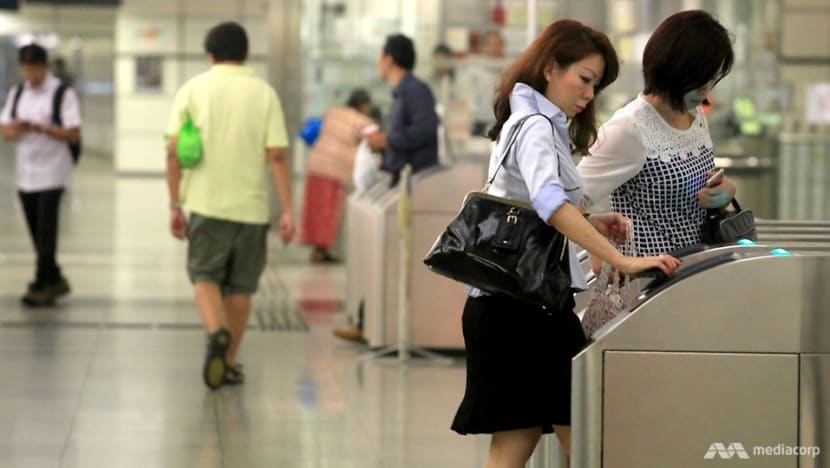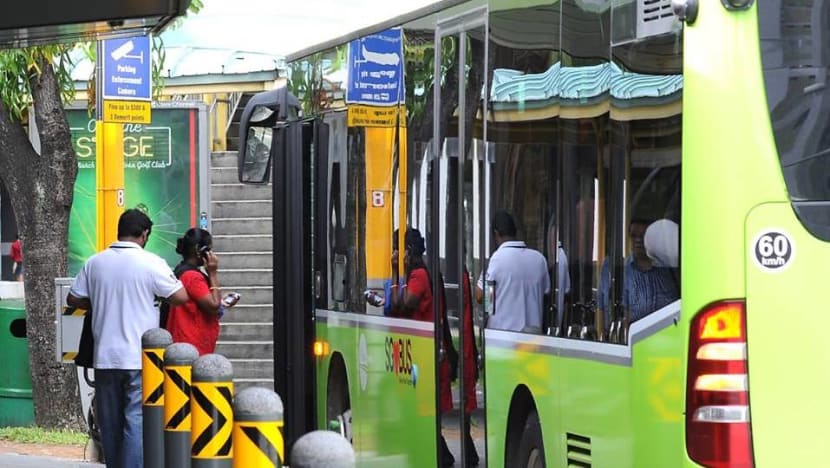commentary Commentary
Commentary: Of course commuting shouldn’t count as work hours
A survey shows more are checking and sending work emails on their commutes on the way to work and back, but that's no reason to move towards counting commuting as work hours, say two observers.

Commuters boarding an MRT train in Singapore. (File photo: AFP/Roslan Rahman)
SINGAPORE: A new study of 5,000 train passengers in London showed that more than half of commuters were checking and sending work e-mails while travelling to and from their jobs.
In response, there has been pressure on employers to consider commuting as work time, potentially reducing commuter pressure during peak hours, and allowing for more comfort and flexibility around office hours.
Should your employers treat your commute as just another part of your workday?
WORKING WHILE IN COMMUTE
There are certainly advantages to making the commute a part of work. According to the latest Moovit Public Transport Index, the average Singaporean spends 84 minutes on public transport, with over 85 per cent reporting that they spend more than two hours on public transportation every day.
For people who would be working during their commute anyway, a commute-as-work policy would ensure that they were getting paid for their work hours on public transportation.
After all, people should be fairly compensated for all the work they do, whether they are in or out of the office.
In Norway, public servants are able to count their commute as working hours.
Commute-as-work also creates an incentive for people to take public transport to work — as those who drive are not able to safely check and respond to their e-mails on the road —reducing vehicle emissions and traffic congestion.

It might even encourage people to live a little farther from their workplaces, potentially alleviating urban density issues in highly-populated areas.
However, commute-at-work comes at a potentially stiff cost.
Commute-as-work raises serious questions about work–life boundaries – where do we draw the line between work and non-work?
If commute-as-work were legitimised, working hours may extend well beyond normal office hours.
RISING EXPECTATIONS AND STRESS
Employers may reasonably expect workers to "be productive" while commuting, and may feel justified in monitoring workers’ activities over the ride back home, letting work creep further and further into people’s everyday lives.
Commute-as-work has the potential to become a "poisoned chalice" that not only extends organisations’ control over people’s lives, but can make work itself more toxic, stressful, and unsustainable.
First, commuting is already stressful in and of itself. The commuting experience is often marked by traffic congestion, crowds, bad weather, and vehicle breakdowns, leading to delays, stress and time pressure.
Research out of the University of Minnesota has shown that commuting stress already leaves people exhausted when they get to work – imagine compounding that exhaustion with the pressure to "be productive" on your commute. And it’s not like the train is an ideal work environment either.
READ: Stressful and rushed but the daily commute is no waste of time, a commentary

Whether you travel to and from work via car, train, bus, bicycle, or walking, it’s never quite as conducive as a proper workspace or your home office.
For those of us who use our mobile phones to check our work e-mails, which most of us do on trains and buses these days, constantly looking down on our mobile phones stresses our spines and may cause symptoms such as stiff necks, back pains and shoulder strains.
Commute-as-work piles stress upon stress on workers who are already strained and overloaded.
BLURRING WORK-LIFE BOUNDARIES
Second, commute-as-work opens the door to even greater surveillance of workers who are expected to work before and after office hours. In a time when most people are already struggling to “switch off” from work and their mobile devices, commute-as-work exacerbates the problem.
Further, some managers may feel entitled to making more work-related demands since organisations are compensating employees while they are commuting.
Work intensification is already a huge problem in organisations as it is. Some of us may prefer to surf social media, read the news or listen to classical music to relax and unwind during our commute.
This freedom to spend our commuting time helps us recover from the daily stresses of our work and non-work responsibilities. The more organisations blur the boundaries between work and non-work, the more people’s family responsibilities are compromised and their family lives suffer.

Third, although the prospect of being compensated for your commute might be enticing, commute-as-work can be prone to the same potential for unfairness that is endemic to other work-intensifying compensation schemes like pay-for-performance.
How do we compensate people for their commutes if their commute time varies? How do we allocate work if commute styles vary? Most importantly — how do we do these things in a manner that is fair to everyone?
It’s like the saying goes: The devil is in the details.
Even if commute-as-work were a good idea, poor execution could potentially create a climate of injustice that undermines its good intentions.
Technology-enabled working has blurred the boundaries between work and life, and implementing commute-as-work is likely to be a step backwards in the pursuit of a healthy and integrated work–life balance.
Carys Chan is lecturer and assistant professor of Management at RMIT University. Rajiv Amarnani is lecturer and assistant professor in Management and Organisational Behaviour at the Australian Catholic University.















